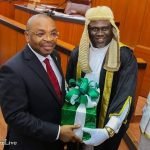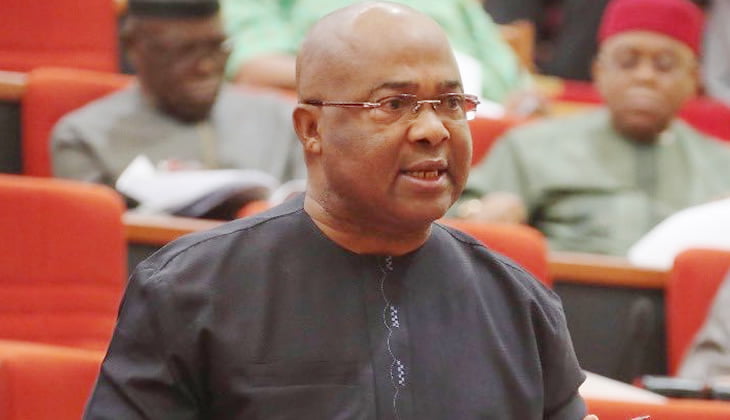Senate Committee on Special Duties, Kabir Yaba Umar, Friday came very hard on Journalists by asking them to go out of the Committee room during the 2020 Budget Defence. The event was the defence session by the North-East Development Commission and the National Commission For refugees, Migrants and IDPs where the Management was to brief the Senate Committee on the 2019 Budget Performance and the 2020 proposals.
The board and management of the NEDC and the refugee commission were billed to intimate Nigerians through the Committee, plans they have to tackle the worsening humanitarian crises and aggravated malnutrition in the insurgency ravaged northeastern part of the country. NASS will adjust defence budget to meet security challenges
The Clerk who chased Journalists away, however dared them to write whatever they like because he had the right to determine who should be allowed into the budget defence session or otherwise. According to Umar, he was working on the directive of the Committee Chairman, Senator Yusuf Abubakar Yusuf, All Progressives Congress, APC, Taraba Central to drive away journalists from media organisations, except the Nigeria Television Authority, NTA and the broadcasting unit of the National Assembly, from covering the event. Umar said, “I have already told your colleagues who had been here before you that you guys are not wanted here.
have the directive of the Chairman to do what I’m doing. ” Asked if he was aware that his action could be reported in the media, Umar said, “Go ahead, I don’t care what you write. The Committee Clerk had on Friday morning sent an invitation to the Senate Press Corps to intimate them of the Committee’ budget defence session with the North-East Development Commission and the National Commission For refugees, Migrants and IDPs.
According to him, the two events would hold at the Senate Committee Room 211 by 2pm and 4pm respectively. Following the invitation, Journalists from various media organisations got to the venue on schedule and started taking notes when Umar walked up to the reporters and ordered them to leave before the very eyes of the Committee Chairman and members of the panel. Members of the Committee included the former Senate Leader, Ali Ndume, APC, Borno South; immediate past governor of Borno State, Kashim Shettima, APC, Borno Central; and former governor of Yobe State, Ibrahim Geidam, APC, Yobe East; Senator Elisha Abbo, PDP, Adamawa North, among others.
Recall that the Senate had last week Thursday defended why it chased Journalists away from covering the defence of 2020 Budget by majority of its Committees with the Ministries Department and Agencies, (MDAs) since it commenced last week Tuesday, saying that allowing the media into the various sessions would be distraction to serious discussions. With the commencement of the budget defence by the MDA, most of the sessions are held behind closed doors away from the earshot of Journalists Senate Committees on Primary Health, Senate Committee on Environment and the Committee on Defence have shut out newsmen from the venue of their meetings with senior officials of the respective MDAs.
Same scenario played out in the Committees on Power and as if planned, the pattern continued when the Committee on Ecology and Climate Change asked journalists to excuse it almost immediately after the opening remarks from the Permanent Secretary of the Ministry of Environment who stood in for the Minister. The Committee on Defence also asked the cameras to leave at some point; which was quite understandable as discussions bothered on Nigeria’s security challenges.
In fact, some of the lawmakers needed the privacy to speak frankly on the budget without fear of being reprimanded by their political parties. Defending the Senate in Abuja while addressing Journalists, Chairman Senate Committee on Media and Public Affairs, Senator Adedayo Adeyeye, All Progressives Congress, APC, Ekiti South who noted that the presence of the media could be a distraction to serious discussions expected at the budget defence sessions, had said:” It isn’t that they want to conduct budget defence in secrecy but serious issues of budget defence, looking at figures, ratifying them, adjusting them don’t necessarily have to be open to the media.
“What I am saying is that there is no secrecy but they need to do serious work. If I want to write a paper now, I want to do serious intellectual work, will I be doing it in the full glare of camera? No! I want us to believe that it is a serious matter. We want to discuss the issues seriously, genuinely, factually. “The press can be called in but sometimes the Committee needs their privacies to do their jobs.
They can at the end of the day call the press to say, “this is what we have done.” If they can do their job without the searchlight of the cameras, they can get the job done. “This is what they have done, it isn’t secrecy. Do you want the Committees to do everything in your presence? I don’t think it is proper. Were you there when the Executive was preparing the budget, but the president came here to present it.
The budget defence can be done behind closed door but then whatever has be done, the best thing is to release it to the public and I think that’s fair enough.” Adeyeye who assured that his Committee would liaise with the other Senate Committees to make their findings available to the public, said, “There is nothing secret about this thing, they are looking at it item by item they couldn’t have released it to the press.
I am going to pass information to chairmen of the various Committees to do the same on their report. They can’t be waiting for the press, or invite you for all these things. We will encourage them to brief you on whatever have been done there is no secrecy there, the budget has been prepared, the documents have been submitted to all senators and we are looking at them, item by item.
” When asked on whether the leadership of the Committees on closed door sessions was not meant to shield the Presidency, Senator Adeyeye who noted that the measure was nothing unusual, said, “When we meet with the MDAs, we queried them on some of the items, do you want us to ask such questions in the presence of the press? It is like you are marking somebody’s script in an exam and you are announcing it! There is no need for that because at the end of the day, the results will be released.
“We aren’t shielding the executive and that’s why we are calling on ministers and heads of MDAs to come and defend their budget.” Also recall that President of the Senate, Senator Ahmad Lawan, had on Monday this denied that senate committees were organising secret budget defence sessions with ministries and agencies of government. Lawan who noted that it was mere misrepresentation of fact to say that journalists were not allowed to cover the budget defence sessions going on at the National Assembly, “There is no shut out of the press from what we do,” Lawan said in a statement by his Special Adviser on Media, Ola Awoniyi. “We need the press to tell Nigerians what we are doing. You(journalists) are our friends. That was a misunderstanding(of what happened).
The President of the Senate who noted that it should be expected that journalists, at some point, may be excused from such meetings when sensitive issues that bother on national security are being discussed, said, “I want to assure Nigerians that whatever we do in this Senate and indeed in this National Assembly is in the best interest of Nigeria.
We will not compromise on anything as far as the national interest is concerned.” The Senate standing order 2015, as amended states in chapter 8(102) on rules of procedure for committees in general states: “Each hearing inducted by each committee or Sub-committee thereof shall be open to the public except when the Committee or sub-committee in opened n session and with a majority present, determines, by roll call shall vote that all or part of the reminder of that hearing on that day shall be closed to the public because disclosure of testimony, evidence or other matters to be considered would endanger national security or would violate any law or rule of the Senate.”





